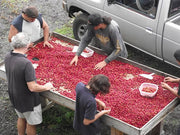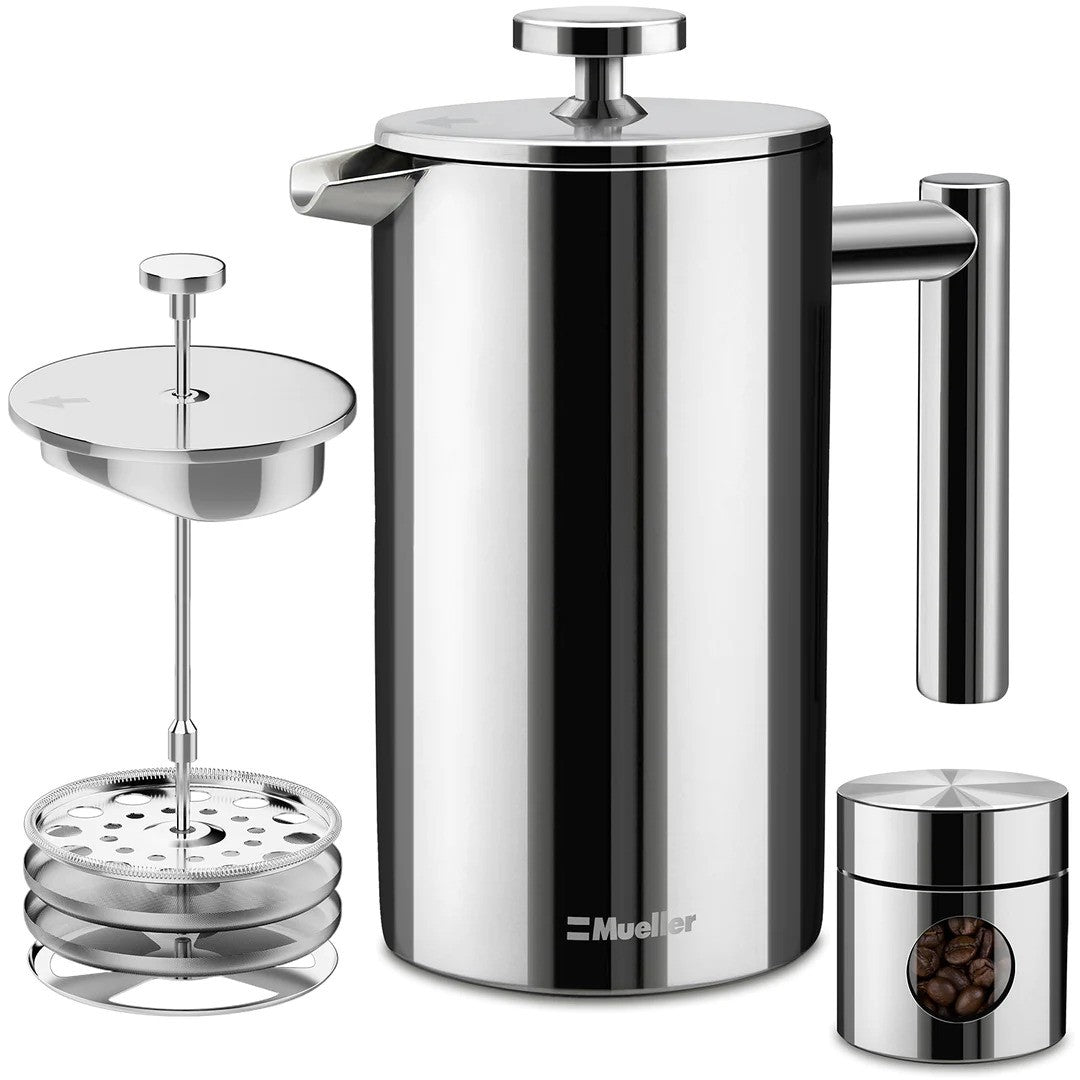Check the Water Before You Brew Your Coffee!
We get a few calls every year from customers who say that their Hula Daddy Kona Coffee doesn’t taste as good at home as it did on our plantation. While we like to think that the ambiance of our plantation adds to the flavor of our coffee, it isn’t really true. The difference is not the geography, it is either the brewer or the water. We always start with the water.
Ninety-eight percent of a cup of coffee is the water. Less than 0.4% of the coffee bean contains the coffee flavor. Put the right water and brewer together and the flavor will come through. Put the wrong water into a brewer and your coffee will taste like restaurant coffee.
Perfect Coffee Brewing Water
The Specialty Coffee Association of America recommends brewing coffee in water that contains 150 parts/millions of total dissolved solids (TDS), 5 grains hardness and a pH close to 7. The SCAA guidelines are vague about what kind of TDSs should be in coffee. Water for coffee needs some hard metal ions to attract the flavor ions in the coffee grounds. In a recent article a water chemist explained: “Hard water is generally considered to be bad for coffee, but we found it was the type of hardness that mattered – while high bicarbonate levels are bad, high magnesium ion levels increase the extraction of coffee into water and improve the taste.” http://goo.gl/tl4qKe
The National Coffee Association in advice for brewing commercial grade coffee says “Use filtered or bottled water if your tap water is not good or imparts a strong odor or taste, such as chlorine. If you are using tap water let it run a few seconds before filling your coffee pot. Be sure to use cold water. Do not use distilled or softened water.” http://goo.gl/ZMONqU (They recommend cold water because it contains more dissolved oxygen.)
The Coffee Brewers website says: “To get a flavorful coffee, there must be mineral content in the water. If the water is distilled, or if it has been softened too much (softening is the process of removing minerals), the extraction will be weak, and the beverage will be relatively flavorless…..” http://goo.gl/hH4xZ2. In contrast, the website says that for espresso coffee distilled water is the best.
Tap Water
All drinking water has some minerals and chemicals. Some of those compounds are positive and add to the refreshing taste. However, there are as many as 315 different mineral and chemical compounds distributed by city water companies, not all of them good for coffee brewing. Additionally, the TDSs in tap water are variable from day to day, because municipalities use multiple water sources. Coffee that tastes great one day may taste entirely different after a heavy rain storm.
All municipal water systems use chlorine to kill bacteria in tap water. Chlorine is an oxidizer which reacts with the flavors in coffee. Using tap water for specialty coffee is a waste of good coffee.
Distilled Water
With all the chemicals that could be in drinking water, it is tempting to just use distilled water. Supermarkets sell bottled distilled water, purified water, and demineralized water. At home, some water systems us distillers to boil water and then re-condense the steam. Distilled water eliminates bacteria, organic solids and metallic ions such as cadmium, chromium, copper, lead and mercury, arsenic, barium, fluoride, selenium and sodium. The result is pure H2O which becomes mildly acidic when it picks up carbon dioxide from the air.
Recently, we had a customer tell us that he only used distilled water for his brewed coffee. He was complaining because he didn’t like the taste of our coffee in his brewer. He told us he liked our coffee when he tasted it at our farm. He also said he liked the taste of very dark roasted supermarket coffee in his brewer.
We told him it was the distilled water. We make our coffee using a high end water filter. We told him that the very dark roasted coffee he liked was masking the poor extraction he was getting. However, with lighter roasts his coffee was going to taste sour.
He didn’t understand why distilled water wasn’t better than spring water. We told him that there were three problems with distilled water 1) distilled water is acidic, 2) it doesn’t contain metallic ions which are necessary to extract flavor from the coffee grounds and 3) it doesn’t contain dissolved oxygen which enhances coffee flavor. We suggested that he try using bottled spring water for his brewed coffee, but continue to use distilled water for his espresso coffee.
Water Softeners
Many homes have built in water softener systems. In a cation water softener, water is forced through a chemical bath that trades minerals with a strong positive charge for minerals with a lesser charge. Water softeners remove metallic ions such as calcium, magnesium and barium. Through ion exchange, this process replaces the minerals in the water with sodium. Good coffee needs these metallic ions to bond with the flavor molecules in the coffee grounds. In addition, sodium when combined with the bicarbonates already in the water, causes the coffee grounds to swell and extends the extraction time which results in over extraction. If too much oil is released, especially bitter oils, it can result in a bitter coffee and often an “oil slick” on the surface of the coffee. Water from water softeners is not a good choice for specialty coffee brewing.
Reverse Osmosis
Some homes have reverse osmosis (RO) filters for drinking water. In an RO filter, water is forced though a semipermeable membrane which allows the water molecules to pass but keeps out larger molecules. RO filters eliminate most contaminants, including germs, cadmium, copper, lead, mercury, arsenic, barium, nitrate/nitrite, perchlorate and selenium. For coffee brewing, RO water has the same problems as distilled water.
RO water doesn’t have the metallic ions that pull the coffee flavors out of the grounds. Without metallic ions coffee tastes flat and lifeless.
Most bottled water companies use reverse osmosis to manufacture “spring water.” However, bottled water companies add oxygen and metallic ions to the water just before they bottle it. There are commercial RO units that add oxygen and metallic ions to coffee shop water after the RO process, but they are expensive and not intended for home use.
Home Water Filters
If you use a water filter make sure that it is designed for brewing drip coffee. Also, make sure it is a high end filter that takes out contaminates that will inhibit the flavor of your coffee. Consumers have a choice of water filters built into the coffee brewer, pitcher water filters, faucet attach filters and in-line filters. Coffee brewer filters, pitcher filters and faucet attach filters are inexpensive and convenient, however, they do not remove all of the contaminants that will affect coffee flavors. Cheap in-line filters are just as bad. Many restaurants make coffee made from tap water run though cheap in-line filters. How many really good cups of coffee have you ever had at a restaurant?
If you do not have an artesian spring with perfect brewing water in your back yard, your choices are either bottled water or a high end in-line filter. There is an interesting comparison of high end water filters at WaterFilterComparisons.com http://goo.gl/nA8tMA. We don’t know how unbiased it is, but it does have some interesting information.
No filter will perform well over the long term unless it receives regular maintenance. As contaminants build up, a filter can not only become less effective, but actually can make your water worse, by starting to release harmful bacteria or chemicals back into your filtered water.
Get more information about brewing quality coffee at https://www.huladaddy.com/
Hula Daddy Kona Coffee is the winner of the 2014 Kona Coffee Cupping Competition and the 2014 Hawaii Coffee Association Coffee Competition. Karen is a member of the Hawaii Coffee Association, the Kona Coffee Council, and the Specialty Coffee Association of America. She is also the author of a number of articles on Kona Coffee including: Coffee Fraud https://www.huladaddy.com/?p=2337: Kona Coffee Farmers at a Crossroad https://www.huladaddy.com/?p=696 ;How Typica is Your Kona Coffee? https://www.huladaddy.com/?p=710 ; Are Roasters Eroding the Kona Coffee Brand? https://www.huladaddy.com/?p=952; Coffee Cupping Competitions – Real or Random Chance? https://www.huladaddy.com/?p=1670 ; Seven Easy Steps to Become a Gourmet Coffee Taster https://www.huladaddy.com/?p=1785 ; How to Brew Coffee Using a Pour Over Filter http://www.huladaddy.com/?p=1754; Before You Buy an Automatic Single Serve Coffee Brewer https://www.huladaddy.com/?p=1899; Siphon Coffee Brewers Suck! https://www.huladaddy.com/?p=2026; Sweet Coffee https://www.huladaddy.com/?p=2144;What Color is Your Coffee Roast? https://www.huladaddy.com/?p=4 you can email her at huladaddycoffee@gmail.com


